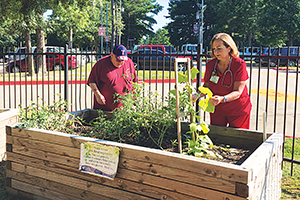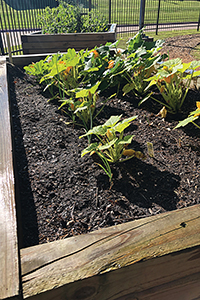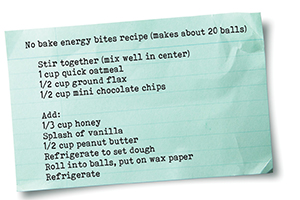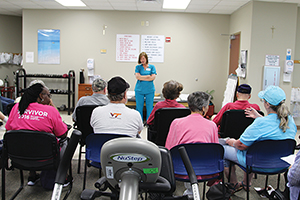Cardiac recovery program promotes alternatives to a high-fat, meat-reliant diet
By RENEE STOVSKYMarshall Huff, 73, of Texarkana, Texas, remembers getting several "whoopings" when he was a child because he refused to eat his vegetables.

"I was always a meat and potatoes kind of guy," he says.
Suffice it to say that's no longer the case. These days, Huff not only eats his veggies — he grows them. And what he doesn't grow, he buys at a local farmer's market each Saturday.
Huff's dietary about-face began after he underwent two extensive open-heart surgeries in 2013. Since then, he's been a regular at Texarkana's CHRISTUS St. Michael Rehabilitation Hospital's cardiac rehab program, getting his heart rate and blood pressure monitored while he exercises to increase his endurance, and listening to dietary lectures to help him decrease his cholesterol level and caloric intake.
His dedication to CLIP (the Continuous Life Improvement Program) there comes from a realization that his health depends on his vigilance in fighting a strong family history of cardiac and vascular disease. His mother died of a massive stroke at 53; his father died of a massive heart attack at 55. And he's outlived one of his sons, who died at 40 of a heart attack, as well.
But his newfound enthusiasm for meatless meals comes from the CROP (CHRISTUS Reapers of Produce) Club, begun 2½ years ago by Carol Blair, supervisor of the cardiac and pulmonary rehab department there.
Blair, who is also a registered respiratory therapist, has worked at St. Michael for 35 years. Throughout that time, she's seen at least 150 new patients come through the cardiac rehab program each year, three days a week for 36 sessions. Too often, despite dietary screenings, she sees many of them complete the program and then return to sedentary lifestyles and unhealthy meals that are particularly popular in the region — fried foods, sausage and plenty of gravy.
Growing enthusiasm
So, when she saw that a greenhouse — originally built on the hospital grounds for patients receiving occupational and physical therapy — was no longer in heavy use, she asked if her cardiac rehab patients could share it. She also took charge of six raised beds in the hospital's courtyard that were built at waist level, so patients could tend them without having to stoop down.

Blair reasoned that if she could entice patients to garden, she could also grow their enthusiasm for embracing a diet that, if not entirely plant-based, would at least increase the amount of vegetables they consumed.
"We don't necessarily advocate pure vegan or vegetarian diets, but most dietitians think meals based on vegetables, fruits, whole grains, fish and chicken are far healthier for our patients than lots of red meat and fried foods," says Blair.

To that end, she obtained soil and fertilizer from the landscaping company that works for the hospital and started recruiting patients to help sow seeds, transplant seedlings, water, weed and pick crops each spring, summer and fall. Some, she says, were already diehard gardeners. Others were novices who were interested in learning how to plant and grow vegetables year-round — everything from tomatoes, bell peppers, cucumbers, onions and beans in summertime to squashes, cabbages and kale in the fall. Currently, there are five patients who are active in the CROP Club.
All the produce the CROP Club grows is shared between members and with the rest of the cardiac rehab patients. Blair also encourages new patients to start their own vegetable gardens by giving each of them a sprout in a cup.
"I tell them the plant represents their rehab and ask them to plant it and watch it grow, just like they will grow through our program. I assure them the plant will produce a vegetable just like they will produce their own results," she says.
Mother would be proud
In addition to gardening, Blair began offering lectures each month where dietitians present a cooking demonstration and recipe giveaway to introduce patients to food items like pizza made with cauliflower crust or lasagna made with zucchini noodles instead of pasta.

"Many of our cardiac patients are diabetics as well, so we try to have low-carb recipe ideas," says Blair.
Among the most popular fare, she says, is a cucumber/strawberry/onion salad with balsamic vinegar and a protein ball made with peanut butter. Kale chips, on the other hand, "didn't go over very well," says Blair.
"I've learned a lot, along with the patients, by doing this," she adds. "They bring in cooking and gardening books all the time. I've been introduced to things like rape green, a smooth-leaved, mild-tasting green that's delicious, and a variety of jalapeño peppers."
For his part, Huff says the cardiac rehab program keeps him exercising every Monday, Wednesday and Friday since his retirement in 2015 from the U.S. Postal Service. And his involvement in the CROP Club — he comes to the hospital grounds to water almost every day in the late afternoon — has inspired him to become a home gardener and a cook as well.
"I've got tomatoes, pepper plants and okra growing in my backyard now," says Huff. And among his favorite dishes are grilled zucchini, skillet squash and a salad fixed with raw cauliflower, onion, celery, black olives and low-calorie mayonnaise.
Huff says he still "likes his meat now and then," but he also likes the mustard, collard and turnip greens, beets and brussels sprouts that he finds at the local farmers' market when they are in season.
"My mother would never believe it, but I even eat spinach now," he laughs.
